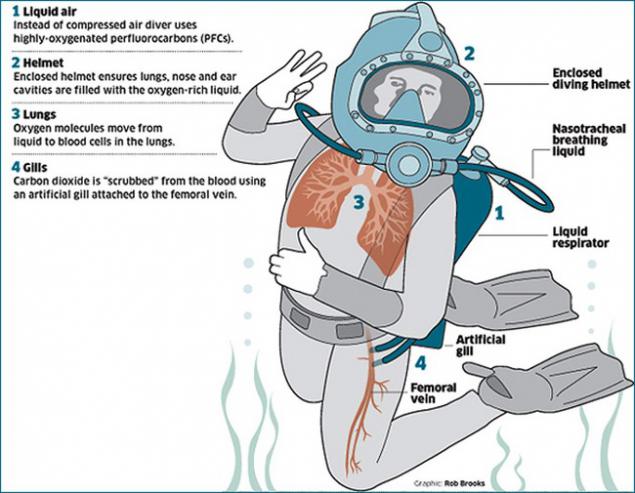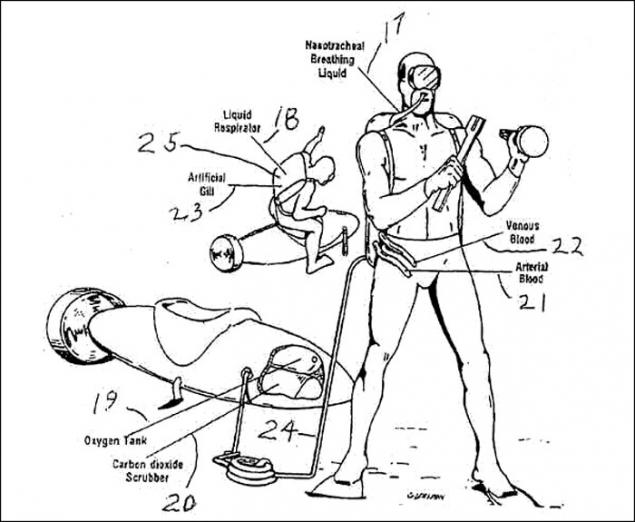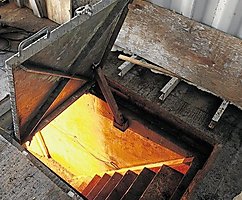Divers future: liquid breath, exhale foot
 Bashny.Net
Bashny.Net
The new invention will allow a person to swim the greatest depths, with no discomfort associated with the use of ordinary diving. The unique suit, where one can easily dive more than 200 meters has developed a 79-year-old American scientist Arnold Lande, a former heart surgeon.
Diving Suit, the main feature of which is a cylinder of "liquid air" - a special liquid enriched with oxygen molecules.
The operating principle of the newly invented equipment is quite simple. "Liquid air" out of the ordinary diving helmet fed into the cylinder, filling all the space around the head and forcing the air out of the lungs, nose, throat and ear cavities. Carbon dioxide, which is released in the breath goes through some sort of gills, attached to the femoral vein in the leg.
Letters +2 photos via techno.bigmir.net

This diving suit will help to overcome the main problem of divers -kessonnuyu disease that occurs during rapid lifting with depth. Its cause is the transition of dissolved gases in the tissues back into the gaseous state. When this oxygen absorbed by the blood, whereas nitrogen, helium and hydrogen can not be quickly absorbed and form bubbles that clog blood vessels and can lead to severe visceral. Because of decompression sickness depth diving is limited: the record currently stands at 318 meters (Nuno Gomez, 2005).
But by inhalation liquid this effect is not observed, Arnold said Landy. And explains that the main problem is to overcome the gag reflex and the natural instinct that prevents the inhalation of fluid. To help divers retired surgeon invented a special, similar to medieval armor breastplate, which compresses the diaphragm and promotes inhalation liquid.
To some such way "vodolazaniya" may seem a fantasy - not for nothing that he appeared in James Cameron's sci-fi movie "The Abyss", released in 1989. However, research in this area being a long time. For example, an American specialist in pediatrics professor Thomas Schaeffer conducting experiments since the late 70s. The scientist believes that "liquid air" can help to survive premature infants whose lungs are not sufficiently developed to breathe air.
The case for "small" - to attract the necessary funding and to find a sufficient number of volunteers who agree to test the invention.

Source:
Diving Suit, the main feature of which is a cylinder of "liquid air" - a special liquid enriched with oxygen molecules.
The operating principle of the newly invented equipment is quite simple. "Liquid air" out of the ordinary diving helmet fed into the cylinder, filling all the space around the head and forcing the air out of the lungs, nose, throat and ear cavities. Carbon dioxide, which is released in the breath goes through some sort of gills, attached to the femoral vein in the leg.
Letters +2 photos via techno.bigmir.net

This diving suit will help to overcome the main problem of divers -kessonnuyu disease that occurs during rapid lifting with depth. Its cause is the transition of dissolved gases in the tissues back into the gaseous state. When this oxygen absorbed by the blood, whereas nitrogen, helium and hydrogen can not be quickly absorbed and form bubbles that clog blood vessels and can lead to severe visceral. Because of decompression sickness depth diving is limited: the record currently stands at 318 meters (Nuno Gomez, 2005).
But by inhalation liquid this effect is not observed, Arnold said Landy. And explains that the main problem is to overcome the gag reflex and the natural instinct that prevents the inhalation of fluid. To help divers retired surgeon invented a special, similar to medieval armor breastplate, which compresses the diaphragm and promotes inhalation liquid.
To some such way "vodolazaniya" may seem a fantasy - not for nothing that he appeared in James Cameron's sci-fi movie "The Abyss", released in 1989. However, research in this area being a long time. For example, an American specialist in pediatrics professor Thomas Schaeffer conducting experiments since the late 70s. The scientist believes that "liquid air" can help to survive premature infants whose lungs are not sufficiently developed to breathe air.
The case for "small" - to attract the necessary funding and to find a sufficient number of volunteers who agree to test the invention.

Source:
Tags
See also
Breathing while running
Five of mysterious places (27 photos, letters, video)
Google is going to create a genetically-molecular map completely healthy person
Elon Musk - "Iron Man" in the real world
5 reasons due to which you will never be enough energy:
26-year-old man received a prosthetic arm with charging for phone, flashlight and drone
5 reasons due to which you never have enough power
Rules of Life Guy Ritchie
Technology of laser additive manufacturing of metal products
HEALING The principles of the body that we have what we have digested

















